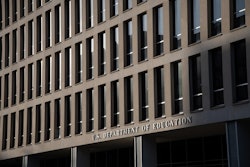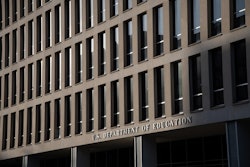Oral arguments in the Supreme Court cases Students for Fair Admissions, Inc. (SFFA) vs. Harvard College and SFFA vs. University of North Carolina (UNC) are nearing. In preparation, the National Association of Diversity Officers in Higher Education held a webinar to discuss not only the potential outcomes, but how institutional leaders, counselors, and chief diversity officers can respond.
 Caroline Laguerre-Brown, vice president for diversity, equity, and community engagement at The George Washington University.
Caroline Laguerre-Brown, vice president for diversity, equity, and community engagement at The George Washington University.
“We now sit at the precipice of what could be a profound retreat on precedent. These cases come with sweeping implications for the hard-fought gains made in higher education, including admission, financial aid, and more,” said Laguerre-Brown. “We need to be ready.”
The cases will be heard by the Supreme Court on Oct. 31. Both will decide whether post-secondary institutions can use race as a consideration in admissions. While the court’s official ruling could take months, the decision could have drastic implications beyond admissions. Current precedent supports the educational benefits of diversity on campus, but an SFFA victory will mean a transition into race-neutral practices and policies.
Art Coleman, former deputy assistant secretary of the U.S. Department of Education’s Office for Civil Rights, and current adjunct professor of enrollment management law and policy at the University of Southern California’s Rossier School of Education, laid out potential outcomes for the ruling.
“We don’t know what the court will do, and I won’t predict it,” said Coleman. “Good policy and planning involve thinking through logically how I can be ready to engage with my stakeholders as we move forward.”
One possible ruling would be in Harvard’s and UNC’s favor, which would result in little to no change in race-based admission practices. The court could also split its decision, ruling for SFFA in one case and not in the other, or it could rule in SFFA’s favor due to minor, discreet points in the argument.















